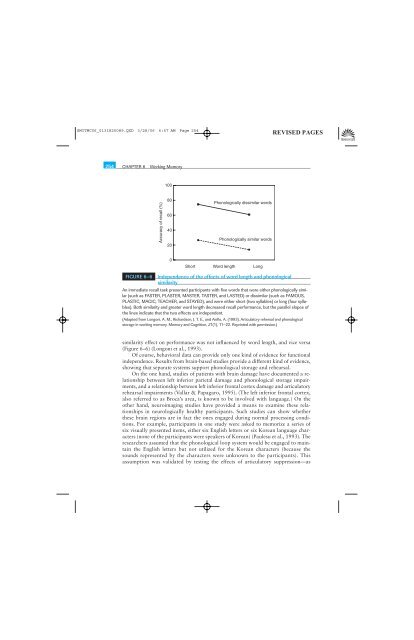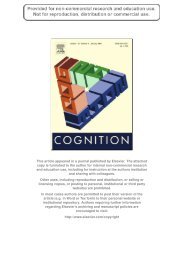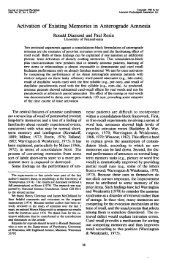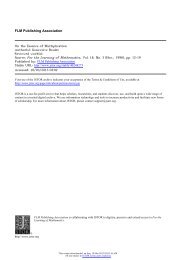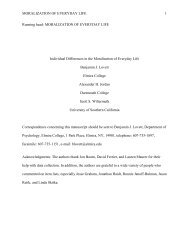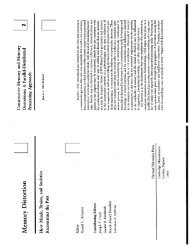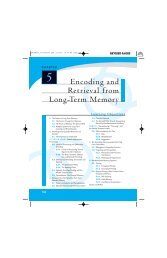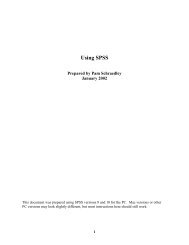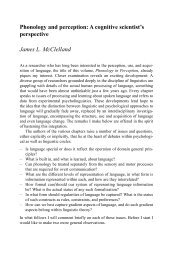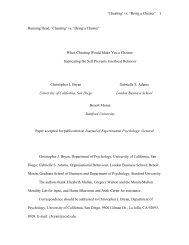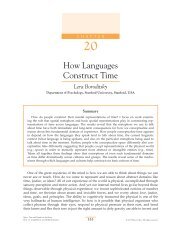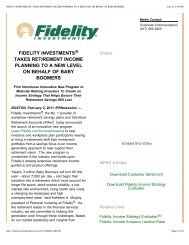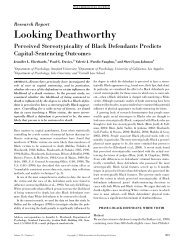Working Memory - Psychology
Working Memory - Psychology
Working Memory - Psychology
Create successful ePaper yourself
Turn your PDF publications into a flip-book with our unique Google optimized e-Paper software.
SMITMC06_0131825089.QXD 3/28/06 6:57 AM Page 254<br />
254 CHAPTER 6 <strong>Working</strong> <strong>Memory</strong><br />
Accuracy of recall (%)<br />
100<br />
80<br />
60<br />
40<br />
20<br />
0<br />
Phonologically dissimilar words<br />
Phonologically similar words<br />
Short Word length Long<br />
FIGURE 6–6 Independence of the effects of word length and phonological<br />
similarity<br />
REVISED PAGES<br />
An immediate recall task presented participants with five words that were either phonologically similar<br />
(such as FASTER, PLASTER, MASTER, TASTER, and LASTED) or dissimilar (such as FAMOUS,<br />
PLASTIC, MAGIC, TEACHER, and STAYED), and were either short (two syllables) or long (four syllables).<br />
Both similarity and greater word length decreased recall performance, but the parallel slopes of<br />
the lines indicate that the two effects are independent.<br />
(Adapted from Longoni, A. M., Richardson, J. T. E., and Aiello, A. (1993). Articulatory rehersal and phonological<br />
storage in working memory. <strong>Memory</strong> and Cognition, 21(1), 11–22. Reprinted with permission.)<br />
similarity effect on performance was not influenced by word length, and vice versa<br />
(Figure 6–6) (Longoni et al., 1993).<br />
Of course, behavioral data can provide only one kind of evidence for functional<br />
independence. Results from brain-based studies provide a different kind of evidence,<br />
showing that separate systems support phonological storage and rehearsal.<br />
On the one hand, studies of patients with brain damage have documented a relationship<br />
between left inferior parietal damage and phonological storage impairments,<br />
and a relationship between left inferior frontal cortex damage and articulatory<br />
rehearsal impairments (Vallar & Papagaro, 1995). (The left inferior frontal cortex,<br />
also referred to as Broca’s area, is known to be involved with language.) On the<br />
other hand, neuroimaging studies have provided a means to examine these relationships<br />
in neurologically healthy participants. Such studies can show whether<br />
these brain regions are in fact the ones engaged during normal processing conditions.<br />
For example, participants in one study were asked to memorize a series of<br />
six visually presented items, either six English letters or six Korean language characters<br />
(none of the participants were speakers of Korean) (Paulesu et al., 1993). The<br />
researchers assumed that the phonological loop system would be engaged to maintain<br />
the English letters but not utilized for the Korean characters (because the<br />
sounds represented by the characters were unknown to the participants). This<br />
assumption was validated by testing the effects of articulatory suppression—as


